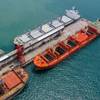In Nicaragua, a Chinese company is busy building what will become one of the world’s largest transoceanic canals. One of the largest engineering projects in history - They call it the Grand Inter-Oceanic Canal.
Engineers say it will surpass the nearby Panama Canal in size and capacity. The canal would be three times as long as Panama’s and able to accommodate larger ships for the world’s cargo traffic. The new project is the largest in Latin America in 100 years.
The $50 billion pharaonic project by a Chinese billionaire, Wang Jing, to cross Central America aims to unite the Atlantic and Pacific oceans by halving the Central American nation, has raised a firestorm of criticism even before it begins.
And some in Nicaragua are gearing up for the fight of their lives to stop it. The environmental organizations think of it as an ugly scar on the map to punish the people and the ecosystem.
Sceptics dismiss as a pipe dream. Though President Daniel Ortega, the former Marxist guerrilla, supports Wang Jing, there are major doubts remain about many aspects of the project, including whether Wang can afford to build it.
Opponents say the dredging and earth-moving will pollute wetlands and rivers and foul Lake Nicaragua, an important source of drinking water and irrigation. Some say that Nicaragua has fallen prey to the Chinese money.
According to Washington Post, President Ortega granted Wang’s canal company, HK Nicaragua Canal Development Investment Co. Ltd, or HKND Group, a 50-year concession, which would give Nicaragua only a small return — $10 million a year — for the first decade of operation, then increasing percentages of the profits in subsequent years.
But even Wang’s Nicaraguan construction partners know little about his other investors or whether the Chinese government, which has denied involvement, is backing the project.
Until now HKNDhas begun building roads, which will be used to bring heavy digging machinery to the Nicaraguan state of Riva.
Nicaraguan government officials say the canal could revolutionize the economy of the second-poorest country in the Americas. Supporters of the project argue that rural poverty has already led to deforestation and that the economy needs to move away from its subsistence on commodities.
Many logistics experts expect a bright future for global shipping and they say by the time the Nicaragua canal is in the place the amount of cargos moving on the world’s oceans will continue to expand.













